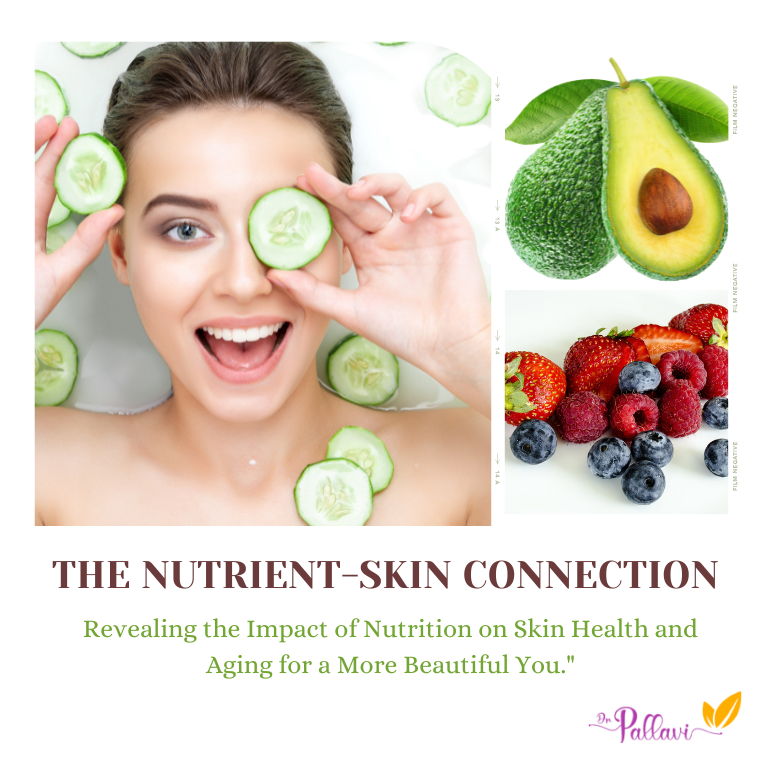
“The Nutrient-Skin Connection: Revealing the Impact of Nutrition on Skin Health and Aging for a More Beautiful You.”
“The Nutrient-Skin Connection: Revealing the Impact of Nutrition on Skin Health and Aging for a More Beautiful You.”
“There is a huge impact of Nutrition on Skin Health”

Growing evidence proves that nutrition plays a critical role in skin health, and several studies have explored the link between diet and skin health.
According to a recent study published in the Journal of the Academy of Nutrition and Dietetics, consuming a diet rich in fruits and vegetables can improve skin health. The study found that people who ate a diet high in fruits, vegetables, and whole grains had fewer wrinkles and better skin elasticity compared to those who ate a diet high in processed and sugary foods.
Another interesting study published in the American Journal of Clinical Nutrition described that Out of 453 adults, those who consumed more fruits and vegetables had less skin wrinkling and less evidence of sun damage compared to those who consumed fewer fruits and vegetables.
There is a significant link between skin diseases and diet
Therefore the food we eat can significantly impact our skin health and appearance.
For example, certain foods that are high in sugar or carbohydrates can cause spikes in insulin levels, which can lead to inflammation and increased sebum production. This can contribute to skin issues like acne and rosacea.

Several studies have explored the link between diet and skin health.
One such study, published in the Journal of the American Academy of Dermatology, found that a low-glycemic diet was associated with improvements in acne. The study involved 43 male participants with acne, who were randomly assigned to either a high-glycemic or low-glycemic diet for 12 weeks. The results showed that those on the low-glycemic diet had significant reductions in acne lesions and inflammation.
Other studies have explored the impact of specific nutrients on skin health. For example, a study published in the Journal of Investigative Dermatology found that vitamin D supplementation improved skin barrier function and reduced inflammation in patients with atopic dermatitis. Another study found that omega-3 fatty acids, found in foods like fatty fish and flaxseeds, can help to reduce inflammation and improve skin hydration.
“Nutrition plays a critical role in skin health because the food we eat provides the building blocks and nutrients necessary for our skin to function properly. Our skin is the largest organ in our body, and it is constantly renewing and regenerating itself. This process requires a variety of nutrients, including vitamins, minerals, and antioxidants, which can only be obtained through the foods we eat.”
Making dietary changes can be an effective way to improve the health and appearance of your skin because certain foods can either help or harm your skin. For example, foods that are high in sugar and carbohydrates can cause spikes in insulin levels, leading to inflammation and increased sebum production. This can contribute to skin issues like acne, rosacea, and premature aging.
On the other hand, foods that are high in antioxidants and anti-inflammatory compounds can help to protect and nourish your skin. For example, foods like leafy greens, berries, nuts, and fatty fish are rich in antioxidants like vitamin C and E, which help to protect your skin from free radical damage and promote collagen production.
Research has also shown that certain nutrients, like vitamin A, zinc, and omega-3 fatty acids, are particularly important for skin health. Vitamin A is essential for skin cell growth and repair, while zinc helps to regulate oil production and prevent acne. Omega-3 fatty acids help to reduce inflammation and improve skin hydration, which can improve the appearance of fine lines and wrinkles.
Overall, these studies suggest that nutrition plays a critical role in skin health, and that making dietary changes can be an effective way to improve the health and appearance of your skin.

Here are some dietary changes that can help to improve the health and appearance of your skin:
- Increase your intake of fruits and vegetables: Fruits and vegetables are rich in vitamins, minerals, and antioxidants that are essential for skin health. Aim to include a variety of colorful fruits and vegetables in your diet, such as leafy greens, berries, citrus fruits, carrots, and sweet potatoes.
- Choose healthy fats: Healthy fats, such as those found in avocados, nuts, seeds, and fatty fish, can help to improve skin hydration and reduce inflammation. Avoid unhealthy fats, such as those found in fried foods and processed snacks.
- Eat more lean protein: Protein is essential for the growth and repair of skin cells. Choose lean sources of protein, such as chicken, fish, tofu, and legumes.
- Avoid processed and sugary foods: Processed and sugary foods can cause inflammation and damage to the skin. Try to limit your intake of these foods and opt for whole, nutrient-dense foods instead.
- Stay hydrated: Drinking plenty of water can help to keep your skin hydrated and flush out toxins. Aim to drink at least 8-10 glasses of water per day.
- Consider supplementing with key nutrients: If you are not getting enough key nutrients from your diet, consider supplementing with a high-quality multivitamin or specific supplements like omega-3 fatty acids, vitamin D, and zinc.
Remember, dietary changes take time to have an impact on your skin, so it’s important to be patient and consistent with your new eating habits. With time, you should start to see improvements in the health and appearance of your skin.
In summary, making dietary changes can be an effective way to improve the health and appearance of your skin because the food you eat provides the nutrients necessary for your skin to function properly. By including more nutrient-rich foods in your diet and avoiding foods that are known to cause inflammation and damage to the skin, you can help to promote healthy, glowing skin.
I hope you found this blog helpful;
Remember to like, share & subscribe!
“Chronic skin diseases are complex to understand as these can result from a variety of contributing factors. To achieve a successful and holistic treatment outcome, I offer my support to help you identify the root cause and design a comprehensive treatment plan. This plan may encompass lifestyle modifications, topical treatments, nutritional plans and natural, herbal & homeopathic remedies with the goal of improving your skin health without any adverse side effects.” – email me at contact@naturalskin.clinic for further enquiry.
